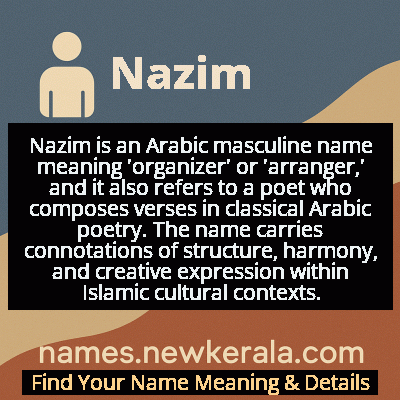Nazim Name Meaning & Details
Origin, Popularity, Numerology Analysis & Name Meaning of Nazim
Discover the origin, meaning, and cultural significance of the name NAZIM. Delve into its historical roots and explore the lasting impact it has had on communities and traditions.
Name
Nazim
Gender
Male
Origin
Muslim
Lucky Number
9
Meaning of the Name - Nazim
Nazim is an Arabic masculine name meaning 'organizer' or 'arranger,' and it also refers to a poet who composes verses in classical Arabic poetry. The name carries connotations of structure, harmony, and creative expression within Islamic cultural contexts.
Nazim - Complete Numerology Analysis
Your Numerology Number
Based on Pythagorean Numerology System
Ruling Planet
Mars
Positive Nature
Generous, passionate, energetic, and humanitarian.
Negative Traits
Impulsive, impatient, moody, and can be overly emotional.
Lucky Colours
Red, maroon, scarlet.
Lucky Days
Tuesday.
Lucky Stones
Red coral, garnet.
Harmony Numbers
1, 2, 3, 6.
Best Suited Professions
Military, sports, philanthropy, leadership roles.
What People Like About You
Courage, energy, leadership, generosity.
Famous People Named Nazim
Nazim Hikmet
Poet
Revolutionized Turkish poetry and became an international literary figure
Nazim al-Qudsi
Statesman
Served as President of Syria and promoted Arab unity
Nazim al-Kawthari
Islamic Scholar
Authored numerous influential works on Hanafi jurisprudence
Nazim Babayev
Musician
Modernized traditional Azerbaijani music forms
Name Variations & International Equivalents
Click on blue names to explore their detailed meanings. Gray names with will be available soon.
Cultural & Historical Significance
Historically, Nazim has been associated with intellectuals, poets, and administrators throughout the Islamic world. During the Golden Age of Islam, individuals named Nazim often held positions requiring organizational skills and creative expression. The name gained additional prominence through various Islamic scholars and leaders who bore it, reinforcing its association with wisdom, leadership, and cultural refinement. In modern times, it continues to represent a bridge between traditional Islamic values and contemporary intellectual pursuits.
Extended Personality Analysis
Individuals named Nazim are typically perceived as highly organized, methodical, and possessing strong leadership qualities. They often exhibit natural abilities in planning and coordination, with a keen eye for detail and structure in both personal and professional endeavors. This organizational aptitude is complemented by creative thinking, as many Nazims demonstrate artistic or literary talents, particularly in areas requiring systematic expression like poetry, architecture, or strategic planning.
In social settings, Nazims are often seen as reliable, disciplined, and principled individuals who value order and harmony. They tend to be thoughtful communicators who express themselves clearly and purposefully. While they may appear reserved initially, they typically possess deep emotional intelligence and form meaningful, lasting relationships. Their combination of practical organizational skills and creative insight makes them effective problem-solvers who can approach challenges from multiple perspectives.
Modern Usage & Popularity
In contemporary times, Nazim remains a popular choice in Muslim communities worldwide, particularly in Turkey, Arab countries, South Asia, and among diaspora communities. While maintaining its traditional appeal, the name has seen some evolution in usage patterns. In recent decades, it has become slightly less common in some urban areas as parents opt for more modern-sounding names, but it continues to hold strong among families valuing cultural heritage and Islamic tradition. The name enjoys particular popularity among educated, middle-class families who appreciate its dual connotations of organizational ability and cultural refinement.
Symbolic & Spiritual Meanings
Symbolically, Nazim represents the harmonious balance between order and creativity, structure and expression. It embodies the concept of cosmic organization and the human capacity to bring order to chaos while maintaining artistic sensibility. The name symbolizes the bridge between practical administration and poetic imagination, suggesting that true wisdom lies in the ability to organize not just physical spaces and systems, but also thoughts, words, and creative expressions. In a deeper spiritual sense, it reflects the Islamic belief in the universe as a perfectly ordered creation and humanity's role as stewards who must maintain and appreciate this divine organization.

